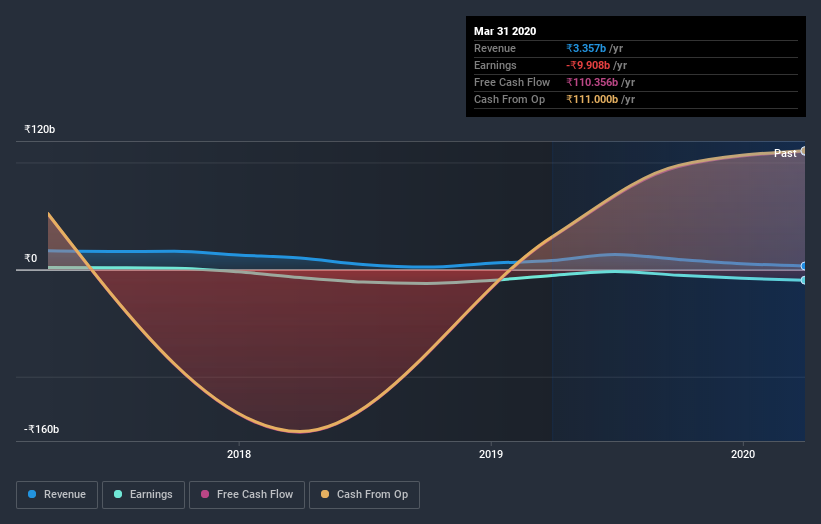Are Institutions Heavily Invested In Punjab & Sind Bank's (NSE:PSB) Shares?

A look at the shareholders of Punjab & Sind Bank (NSE:PSB) can tell us which group is most powerful. Institutions often own shares in more established companies, while it's not unusual to see insiders own a fair bit of smaller companies. We also tend to see lower insider ownership in companies that were previously publicly owned.
Punjab & Sind Bank is not a large company by global standards. It has a market capitalization of ₹9.9b, which means it wouldn't have the attention of many institutional investors. In the chart below, we can see that institutional investors have bought into the company. Let's take a closer look to see what the different types of shareholder can tell us about Punjab & Sind Bank.
Check out our latest analysis for Punjab & Sind Bank

What Does The Institutional Ownership Tell Us About Punjab & Sind Bank?
Institutional investors commonly compare their own returns to the returns of a commonly followed index. So they generally do consider buying larger companies that are included in the relevant benchmark index.
We can see that Punjab & Sind Bank does have institutional investors; and they hold a good portion of the company's stock. This implies the analysts working for those institutions have looked at the stock and they like it. But just like anyone else, they could be wrong. It is not uncommon to see a big share price drop if two large institutional investors try to sell out of a stock at the same time. So it is worth checking the past earnings trajectory of Punjab & Sind Bank, (below). Of course, keep in mind that there are other factors to consider, too.

Hedge funds don't have many shares in Punjab & Sind Bank. Our data shows that India is the largest shareholder with 83% of shares outstanding. This implies that they have majority interest control of the future of the company. For context, the second largest shareholder holds about 6.0% of the shares outstanding, followed by an ownership of 0.1% by the third-largest shareholder.
Researching institutional ownership is a good way to gauge and filter a stock's expected performance. The same can be achieved by studying analyst sentiments. As far I can tell there isn't analyst coverage of the company, so it is probably flying under the radar.
Insider Ownership Of Punjab & Sind Bank
While the precise definition of an insider can be subjective, almost everyone considers board members to be insiders. Management ultimately answers to the board. However, it is not uncommon for managers to be executive board members, especially if they are a founder or the CEO.
Most consider insider ownership a positive because it can indicate the board is well aligned with other shareholders. However, on some occasions too much power is concentrated within this group.
Our data suggests that insiders own under 1% of Punjab & Sind Bank in their own names. It has a market capitalization of just ₹9.9b, and the board has only ₹16k worth of shares in their own names. Many investors in smaller companies prefer to see the board more heavily invested. You can click here to see if those insiders have been buying or selling.
General Public Ownership
With a 11% ownership, the general public have some degree of sway over PSB. While this size of ownership may not be enough to sway a policy decision in their favour, they can still make a collective impact on company policies.
Next Steps:
It's always worth thinking about the different groups who own shares in a company. But to understand Punjab & Sind Bank better, we need to consider many other factors. Like risks, for instance. Every company has them, and we've spotted 3 warning signs for Punjab & Sind Bank (of which 1 makes us a bit uncomfortable!) you should know about.
Of course this may not be the best stock to buy. So take a peek at this free free list of interesting companies.
NB: Figures in this article are calculated using data from the last twelve months, which refer to the 12-month period ending on the last date of the month the financial statement is dated. This may not be consistent with full year annual report figures.
If you’re looking to trade Punjab & Sind Bank, open an account with the lowest-cost* platform trusted by professionals, Interactive Brokers. Their clients from over 200 countries and territories trade stocks, options, futures, forex, bonds and funds worldwide from a single integrated account. Promoted
New: Manage All Your Stock Portfolios in One Place
We've created the ultimate portfolio companion for stock investors, and it's free.
• Connect an unlimited number of Portfolios and see your total in one currency
• Be alerted to new Warning Signs or Risks via email or mobile
• Track the Fair Value of your stocks
This article by Simply Wall St is general in nature. It does not constitute a recommendation to buy or sell any stock, and does not take account of your objectives, or your financial situation. We aim to bring you long-term focused analysis driven by fundamental data. Note that our analysis may not factor in the latest price-sensitive company announcements or qualitative material. Simply Wall St has no position in any stocks mentioned.
*Interactive Brokers Rated Lowest Cost Broker by StockBrokers.com Annual Online Review 2020
Have feedback on this article? Concerned about the content? Get in touch with us directly. Alternatively, email editorial-team@simplywallst.com.
About NSEI:PSB
Punjab & Sind Bank
Provides various banking and financial products and services in India.
Adequate balance sheet with questionable track record.
Market Insights
Community Narratives




